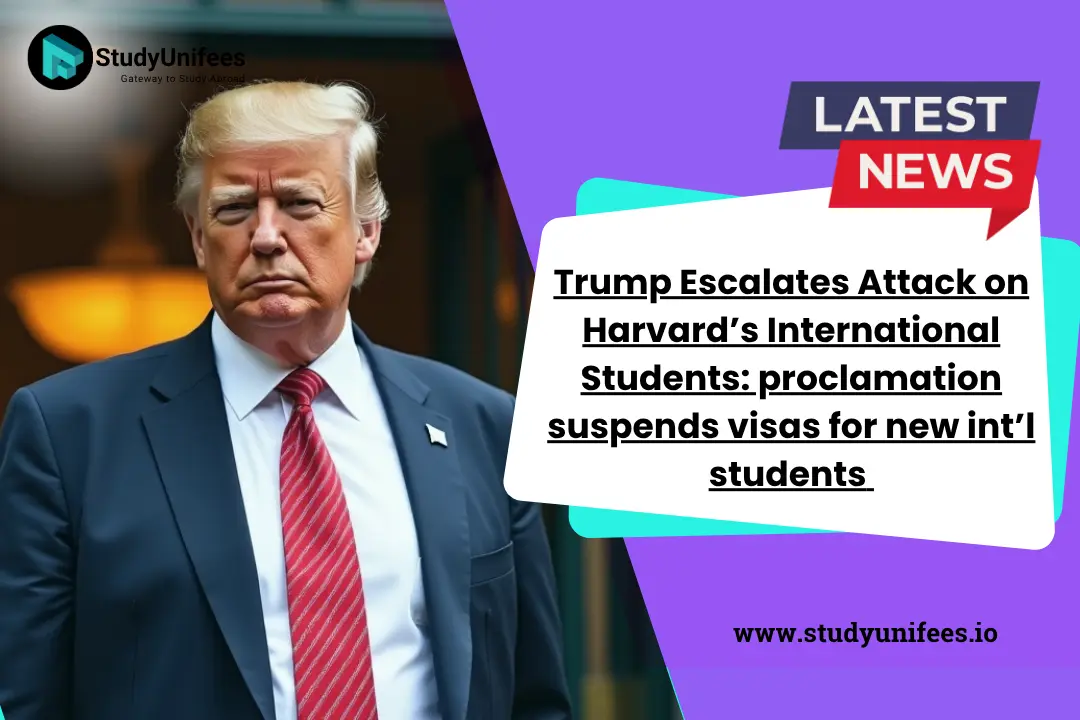Trump Escalates Attack on Harvard’s International Students: proclamation suspends visas for new int’l students

Trump Escalates Attack on Harvard’s International Students: proclamation suspends visas for new int’l students
Latest Attack and Previous Moves
On Wednesday 4th June, President Donald Trump signed a proclamation suspending international visas for new students at Harvard University, marking a significant escalation in the administration’s ongoing conflict with the Ivy League institution. The order temporarily blocks nearly all new Harvard students from entering the United States under F, M, and J visas, which are commonly used by international students for academic study and exchange programs. Additionally, the proclamation directs the Secretary of State to consider revoking these visas for current Harvard students meeting specific criteria, casting uncertainty over the futures of thousands of international students, who comprise about 27% of Harvard’s student body (6,793 students in the 2024-2025 academic year).
This move follows a series of aggressive actions against Harvard. In March, the Trump administration initiated a review of Harvard’s roughly $9 billion in federal contracts and grants. Subsequently, the White House froze $2.2 billion in federal funding and later cut an additional $450 million in grants, citing Harvard’s refusal to comply with demands to alter campus policies, including those related to diversity, equity, and inclusion (DEI) and addressing antisemitism. Last month, Homeland Security Secretary Kristi Noem attempted to revoke Harvard’s certification under the Student and Exchange Visitor Program (SEVP), which would have barred the university from enrolling foreign students. This action was blocked by US District Court Judge Allison Burroughs, who issued a temporary injunction and later a longer-term hold to protect Harvard’s international students while legal proceedings continue. The administration also recently canceled $100 million in remaining federal contracts with Harvard and has threatened to revoke the university’s tax-exempt status.
Trump Administration’s Justification
The White House justifies the visa suspension as a measure to “safeguard national security,” accusing Harvard of having “concerning foreign ties and radicalism.” The proclamation claims the university failed to provide sufficient information about foreign students’ disciplinary records, reporting “deficient data on only three students.” It further alleges that Harvard is either not fully reporting or not adequately policing its foreign students. The administration also criticizes Harvard for failing to address antisemitism on campus and for prioritizing DEI initiatives, which it labels as “racist.” The proclamation asserts that “Harvard’s conduct has rendered it an unsuitable destination for foreign students and researchers.” The order, set to last six months unless extended, exempts students whose entry is deemed in the national interest and does not apply to those attending other US universities through the SEVP program.
Harvard’s Reaction
Harvard has vehemently opposed the proclamation, calling it an illegal and retaliatory attack on its academic community. A university spokesperson stated, “This is yet another illegal retaliatory step taken by the Administration in violation of Harvard’s First Amendment rights.” The university emphasized its commitment to protecting its international students, with the spokesperson adding, “We will continue to protect our international students.” Last month, following the administration’s attempt to ban Harvard from enrolling foreign students, university spokesperson Jason Newton warned, “This retaliatory action threatens serious harm to the Harvard community and our country, and undermines Harvard’s academic and research mission.” Harvard argues that the administration’s actions are a direct response to the university’s refusal to comply with ideologically driven policy demands, particularly around campus programming, admissions, and hiring practices.
Legal Challenges Ahead
Harvard is poised to mount a robust legal defense against the proclamation. The university has already demonstrated success in challenging the administration’s actions, as evidenced by Judge Burroughs’ recent rulings blocking the SEVP certification revocation. Harvard is likely to argue that the proclamation violates its First Amendment rights, as it did in response to earlier actions, asserting that the administration’s demands infringe on academic freedom and institutional autonomy. The university could also contend that the proclamation fails to adhere to proper administrative procedures, similar to its argument that the SEVP revocation did not follow established requirements. Harvard may seek an injunction to halt the visa suspension, citing irreparable harm to its international students and academic mission. Additionally, the university could challenge the proclamation’s vague criteria for visa revocations and its selective targeting of Harvard, arguing that it constitutes discriminatory and arbitrary enforcement. Given the significant financial contributions of international students—who often pay full tuition without federal aid—Harvard may also highlight the broader economic and academic impact on American higher education.
The ongoing legal battle underscores a broader conflict between the Trump administration and elite universities, with Harvard at the forefront. As the university navigates these challenges, the outcome will likely have far-reaching implications for international education and academic freedom in the United States.
